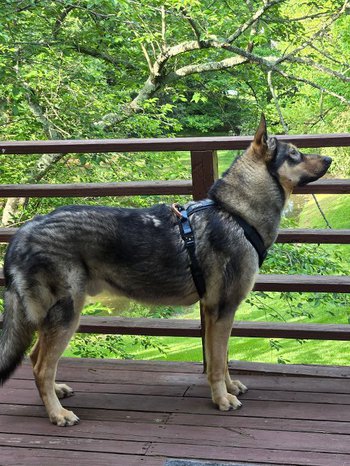Why would we never join the Companion Dog Project?
By Jennifer Stoeckl, MAT, OFS - Dire Wolf Project co-founder and CEO, Aug. 19, 2025
From time to time, people ask whether the Dire Wolf Project would consider joining the Companion Dog Project (CDP). Since the question has arisen more than once, I want to share my thoughts here, so that those curious about our stance have a clear and thorough answer.
The CDP is a new registry that welcomes any companion dog—purebred or crossbred—and holds its breeders to strict requirements regarding ethics, health testing, and husbandry. At first glance, this direction is admirable. After all, any movement toward higher standards in dog breeding is a step in the right direction for our loyal, tail-wagging companions. We applaud the effort. But while there is much we agree with, there are also deep philosophical differences that prevent us from joining.
Let me explain.
The CDP’s list of what makes an ethical breeder resonates with us completely. Health and temperament should always come before outward appearance. This principle stands as a pillar of the Dire Wolf Project as well, where our focus has never been on fashion or fleeting beauty but on the substance of the dog: their mind, their heart, their body.
We also agree wholeheartedly with the CDP’s Code of Ethics. The call for breeders to treat one another with fairness, honesty, and respect mirrors the very pack dynamic we strive to build—breeders not as rivals, but as companions in the hunt for better dogs. Just as wolves survive by pulling together, so must dog breeders learn to work side by side for the sake of the animals in their care.
Finally, most of CDP’s husbandry standards align with our own. Safe birthing, attentive care for dam and pups, appropriate veterinary oversight, and protection from needless suffering—these are non-negotiables in our work as well.
So why would we not align ourselves with the Companion Dog Project?
1. Oversight vs. Internal Conviction
The CDP’s reliance on strict checklists creates a problem: rules without culture. Without a strong structural underpinning that binds breeders into a cooperative pack, regulation quickly collapses into competition, backstabbing, and deception. I’ve seen it happen too many times.
True ethical breeding cannot be policed into existence; it must be born from an internal conviction that integrity matters. Oversight can help, yes, but only if paired with mentorship, shared knowledge, and breeder accountability rooted in mutual trust.
2. Competition vs. Collaboration
The CDP calls for breeders not to view one another as competitors. This is a noble goal—but without systems that actually foster collaboration, words alone cannot shift the age-old habit of rivalry.
The Dire Wolf Project is built on the belief that breeders must act as a pack. A lone wolf struggles, but a united pack thrives. We design our structures to encourage mentorship, community, and collective responsibility so that our work never devolves into an “every breeder for themselves” mindset.
3. Narrow Husbandry Standards
Many of CDP’s husbandry rules are sound, but their language is limiting. It assumes that only one model of modern breeding husbandry is valid. In truth, there is more than one way to raise strong, healthy dogs.
For instance, a wolf dam raising her litter in a subterranean den dug below the frost line would fail nearly all of CDP’s requirements—yet her method produces pups hardy, safe, and perfectly adapted to their world. The natural den is cool in summer, warm in winter, sanitary by design, and shaped to prevent accidents. It is dark, quiet, and protective of developing senses. Nature has always been the best architect.
This is not to say breeders should abandon safety and care, but that standards should emphasize outcomes—warmth, quiet, safety, and low stress—rather than rigid checklists that eliminate natural husbandry practices simply because they do not fit modern molds.
4. The Health Testing Philosophy
Perhaps the most significant divergence lies here. The CDP requires a long list of health tests for all dogs, regardless of breed-specific data. This reflects a disease-prevention model of breeding: test widely, restrict broadly, and attempt to prevent the spread of illness.
The Dire Wolf Project, however, follows a disease-elimination model. We do not believe in waiting to breed until every certifying body approves of a dog. Instead, we strategically select breeding pairs to remove disease from the gene pool over time. It is a proactive, sustainable approach that looks beyond individual dogs and aims at the health of the breed as a whole.
This philosophy is fundamental to who we are. It is explained fully in our book, which I encourage anyone interested in our methods to read.
We admire the Companion Dog Project for moving the conversation in a better direction. Their intentions are noble, and their concern for the welfare of dogs is genuine. But while we share much common ground, we diverge at critical junctures.
The Dire Wolf Project stands for:
- Ethical breeding rooted in health and temperament above all.
- Building a breeder culture that functions as a united pack, not as isolated rivals.
- Embracing natural, instinct-driven husbandry alongside modern care.
- Pursuing a disease-elimination model rather than a disease-prevention model.
For those who want to understand why we have chosen this path, I invite you to explore our book on the Dire Wolf Project. There you will find the philosophy laid out in full, from its Ice Age roots to its modern-day application:
👉 The Dire Wolf Project Book
Because at the end of the day, our mission is clear: to breed dogs of noble character and sound health; companions worthy of the dire wolf’s legacy.
Join our Inner Circle community and receive all of our daily blog posts: https://mailchi.mp/direwolfproject/sign-up